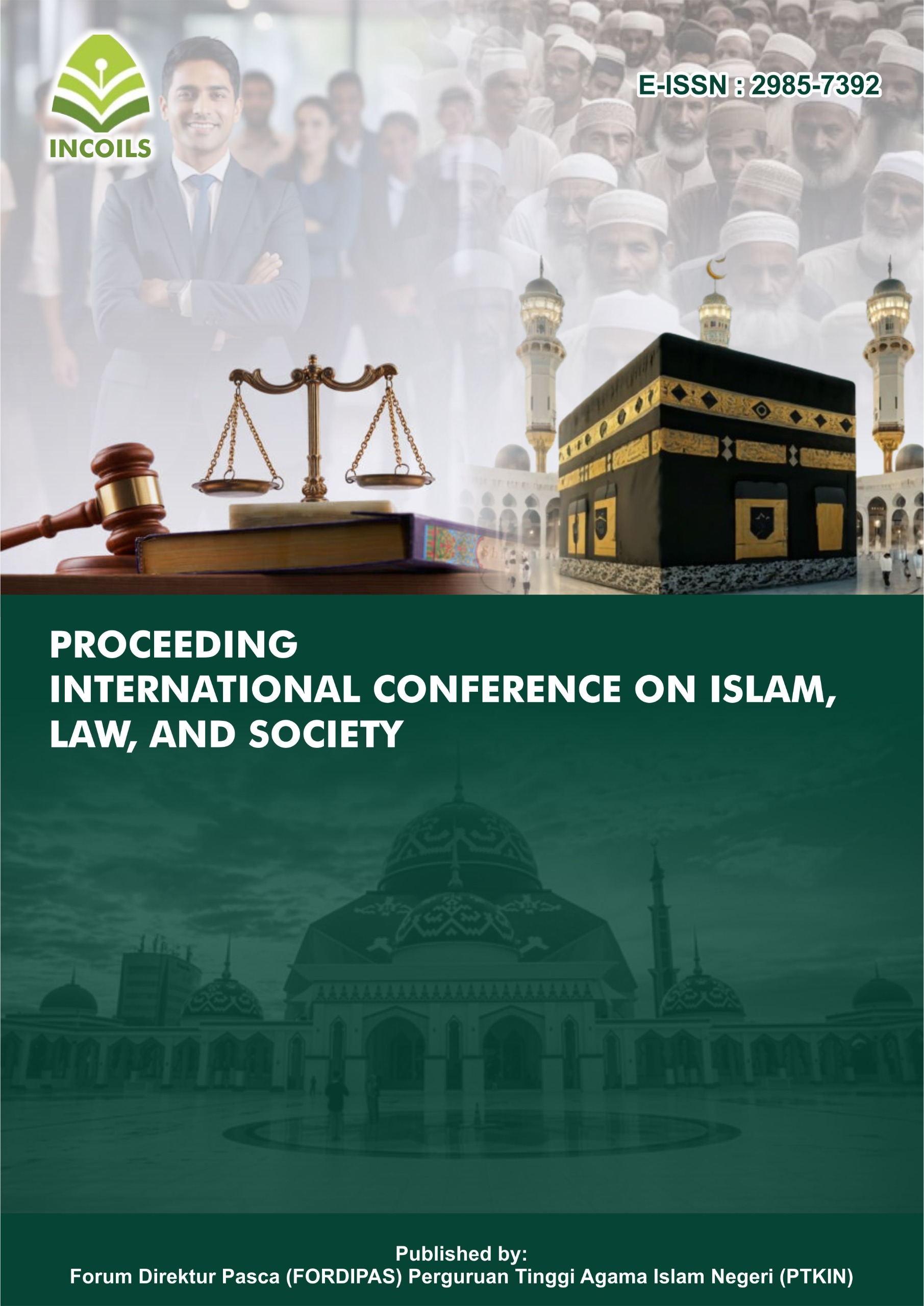Transformatıon Strategıes of School Prıncıples ın Increasıng Learnıng Effectıveness Post-Covıd-19 Pandemıc at Mts Maarif NU 2 Sutojayan Blitar
DOI:
https://doi.org/10.70062/incoils.v2i1.109Keywords:
Learning Effectiveness, Covid-19, Transformational StrategyAbstract
The Covid- 19 pandemic poses a significant challenge to leadership in schools around the world. Empowering teachers during the pandemic with some transformative strategies is absolutely necessary. The aim is to maintain the continuity of education in schools and empower teachers to stay close to the 4 (four) teacher competencies; pedagogic competence, social competence, personality competence and professional competence.
This study aims to reveal the principal's strategy to build teacher skills so that they have a greater impact on the school system, as well as foster teacher confidence. The application of this transformative leadership can contribute to empowering teachers to improve the effectiveness of learning in their schools in the midst of the covid-19 pandemic, Researchers formulate problems (1) How is the Principal Transformation Strategy in increasing the effectiveness of learning after the Covid-19 pandemic and (2) How is the Effectiveness of Learning which is carried out at MTs Maarif NU 2 Sutojayan Blitar to improve learning effectiveness.
Methods This research uses a field study with a descriptive qualitative approach . The research was carried out at MTs Maarif NU 2 Sutojawan Blitar, for 2 months, on June 5 – August 5, 2022. Data collection techniques were through observation, interviews, and documentation. Technical data analysis is a single data analysis technique by taking the method from Miles and Hubberman & Saldana.
The results show the conclusion that school principals have a strategic role in overseeing the success of the learning process after the COVID-19 pandemic. Three transformations of the principal's learning at MTs Maarif NU 2 Sutojayan Blitar in increasing the effectiveness of learning (1) granting autonomy to teachers, (2) transformation of emotional intelligence and (3) transformation of collaboration. The effectiveness of learning is carried out by (1) strengthening the capacity of CAR to review essential material, (2) compiling learning blocks, (3) carrying out blended learning practices when learning directly (offline), and (4) returning students from character lost and lost learning.
References
Agus Purwowidodo dkk, “Implementasi Gaya Kepemimpinan Transformatif Dalam Peningkatkan Daya Saing Pendidikan (Kajian Multikasus Di Mi Perwanida Kota Blitar Dan Sdi Al-Munawar Kabupaten Tulungagung)”, TA’ALLUM: Jurnal Pendidikan Islam Halaman 309-332 p-ISSN: 2303-1891; e-ISSN: 2549-2926, Volume 8, Nomor 2, Desember, (2020),
Asti, E. “Pengaruh Hubungan Pembelajaran Daring di Era Pandemi Covid-19 Terhadap Mental Peserta Didik”. Epistema, 2(2), 83–89, (2021).
Behrstock-Sherratt, E., Brookins, P., & Payne, G. Teacher leadership in uncertain times: Recommendations from board-certified teachers for school, district and state leaders. Cambridge: University Press, (2020).
Chan, J. C. A., López, M. V. E., De Lourdes Pinto Loria, M., & Briceño, E. D. “The Hard Teacher’s Leadership Coping to the COVID-19 Pandemic”. World Journal of Education, 10(4), 55–63, (2020).
COVID-19 “infection: Emergence, transmission, and characteristics of human coronaviruses”, Journal of Advanced Research, Volume 24, Pages 91-98, ISSN 2090-1232, (2020).
Dwi, H. R., & Aro’fah, S. “Pentingnya Pemahaman Masyarakat Melalui Edukasi Tentang Protocol Kesehatan Menghindari Penularan Covid-19 di Wilayah Kerja Puskesmas Rimbo Tengah Muara Bungo”. Jurnal Kreativitas Pengabdian Kepada Masyarakat (PKM), 4(6), 1384–1389, 2021).
Edwin Darrell de Klerk,dkk, “Transformative Intervention Strategies for Teacher Leaders During the Pandemic and Beyond”, International Journal of Learning, Teaching and Educational Research Vol. 20, No. 9, pp. 52-67, Received Jun 18, 2021; Revised Sep 03, 2021; Accepted Sep 18, (2021).
Eschenbacher, S., & Fleming, T. (2020). Transformative dimensions of lifelong learning: Mezirow, Rorty and COVID‑19. International Review of Education, 66, 657–672, (2021).
Gibson, Organisasi dan manajemen: perilaku, struktur, proses, Terj. Organization, Ed. Cet 4. Jakarta: Erlangga, (1994)
Gibson, Organisasi dan manajemen: perilaku, struktur, proses, Terj. Organization, Ed. Cet 4. Jakarta: Erlangga, (1994).
Hart, C. Educators are learners, too. https://www.ednc.org/perspective-educators-are-learners-too/ (2020).
Ivey, G., & Johnston, P. H. “Engaged reading as a collaborative transformative practice”. Journal of Literacy Research, 47(3), 297–327, (2015).
Mills, L. B. “A Meta-Analysis of the Relationship Between Emotional Intelligence and Effective Leadership”. Journal of Curriculum and Instruction, 3(2), (2009).
Montuori, A., & Donnelly, G. Transformative leadership. In J. Neal (Ed.), Handbook of personal and organizational transformation (pp. 1–33). Springer, (2017).
Muhammad Adnan Shereen, Suliman Khan, Abeer Kazmi, Nadia Bashir, Rabeea Siddique,
Nel, W. N. “Critical community psychology in education: an argument for transformative autonomy”. South African Journal of Higher Education, 28(3), 787–797, (2014).
Nelson, D., Low, G., & Hammett, R. “Twenty First Century Skills for Achieving Education, Life, Work Success 1. Education and Learning Model of Emotional Intelligence”. American Journal of Educational Research, 5(2), 197–206, (2017).
Parker, G. Teachers’ autonomy. Research in Education, 93(1), 19–33, (2015).
Rizal.. “Mengajar Cara Berpikir, Meraih Ketrampilan Abad 21”. Seminar Nasional Pendidikan PGSD UMS & HDPGSDI Wilayah Jawa Pendidikan, 390–406, (2017).
Schiuma, G., Schettini, E., Santarsiero, F., & Carlucci, D. “The transformative leadership compass: six competencies for digital transformation entrepreneurship”. International Journal of Entrepreneurial Behaviour and Research. (2021).
Souza, A., & Leung, A. Transformative Leadership in Education. Journal of Transformative Leadership & Policy Studies, 8(2), 88–91, (2020).
Sugiarto, A. “Efektivitas pembelajaran daring pada kondisi WFH/WFO di Madrasah Ibtidaiyah Kecamatan Reban”. TEACHING : Jurnal Inovasi Keguruan Dan Ilmu Pendidikan, 1(3), 137–143, (2021).
Sugiyono, Metodologi Penelitian Kualitatif Kuantitatif, R &D, Bandung: Alfabeta, (2008).
Uribe-Florez, L., Al-Rawashdeh, A., & Morales, S. “Perceptions about teacher leadership: Do teacher leaders and administrators share a common ground?” Journal of International Education and Leadership, 4(1), 1-15, (2014).
Walker, J. Shame and transformation in the theory and practice of adult learning and education. Journal of Transformative Education, 15(4), 357–374., (2017).
Wenger, E. Communities of practice: Learning, meaning, and identity. UK: Cambridge, 1998
Downloads
Published
How to Cite
Issue
Section
License

This work is licensed under a Creative Commons Attribution-ShareAlike 4.0 International License.







